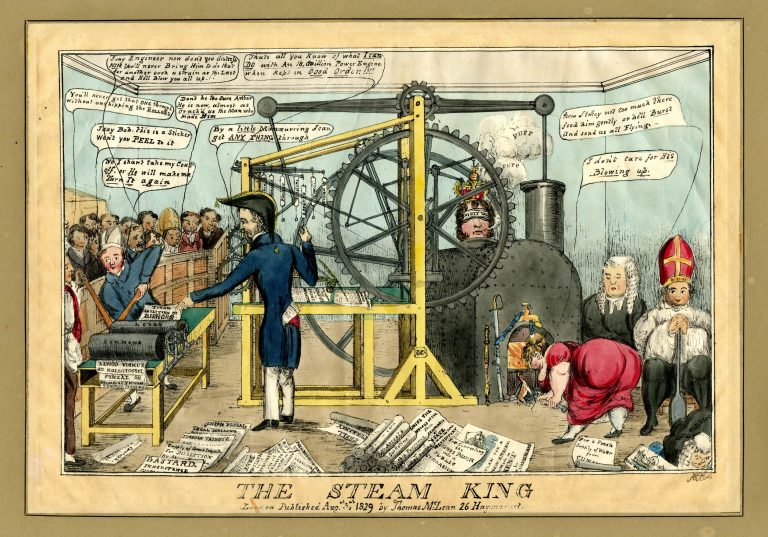University of Glasgow, 11 – 12 April 2019
Plenary Speakers: Ian Duncan (Berkeley) and Angela Esterhammer (Toronto)
The reign of George IV was a decade of profound transformations, during which technological, generic and ideological innovations opened up culture to unprecedentedly vast audiences, mandating the creation of new modes of communication and production, but also triggering fears about the loss of social cohesion and nostalgia for perceived lost identities. By 1830, Samuel Taylor Coleridge felt empowered to contend that ‘Roads, canals, machinery, the press, the periodical and daily press [and] the might of public opinion’ had fundamentally reconfigured political and social discourse.
The 1820s were bracketed at one end by the Six Acts of 1819 and the century’s final executions for high treason in 1820 and at the other by Catholic Emancipation in 1829, the Reform Bill of 1832 and the Slavery Abolition Act of 1833. Thinking and communicating on national, colonial and global scales became increasingly common. Commercial steamboats linked London and Leith in 1821 and by 1829 connected Britain with India. By 1825, steam-driven presses had become five times more efficient than the best handpresses. Combined with cheaper paper, advances in the use of stereotyping and illustration techniques like wood and steel engraving, faster printing allowed new forms and formats to circulate widely. These years saw the foundation of a plethora of periodicals, including the London Magazine (1820), the New Monthly Magazine (1821) and The Liberal (1822), alongside pioneering cheap publications including The Mirror of Literature, Amusement, and Instruction (1822), The Lancet (1823) and the Penny Magazine, which in 1832 attracted over 200,000 purchasers per issue. Albums, annuals, anthologies and translations proliferated, as did new networks and institutions, including provincial societies, mechanics’ institutes, specialised national organisations, education providers and the Society for the Diffusion of Useful Knowledge. This was a self-fashioning and speculative age that reflected constantly upon itself; notable instances include William Hazlitt’s Spirit of the Age essays (1824-5), Thomas Carlyle’s ‘Signs of the Times’ (1829) and Johann Wolfgang von Goethe’s notion of world literature. The voices of women and the working classes became progressively more audible even as increasingly sharply-defined disciplines sought to secure hierarchies of talent, profession and authority.
In examining these issues and others, this conference aims to produce a new understanding of the underappreciated innovations and diffusions that occurred during the 1820s. Topics to be considered include, but are not limited to:
- The Spirit of the Age: the March of Intellect, the Industrial Revolution, profits and crashes, self-reflection, doubt, fashion, periodicity, collections and recollections.
- Media, mediality and technology: periodicals, serials, albums, annuals, illustration, performance, spectacle, parody, materiality, ephemera and ephemerality.
- The proliferation of institutions: libraries, literary and philosophical societies, museums, schools, universities, book clubs, prisons, standards, scales, disciplines.
- Reform and reaction: politics, labour relations, humanitarianism, slavery, religious toleration, Bolivarian republics, penal reform, protectionism, animal rights.
- Cultural mediators: writers, editors, critics, booksellers, translators, administrators, publishers, artists, collaborators, coteries, ‘minor’ authors, belatedness.
- Public(s) and audiences: readers, viewers, learners, players, nations, spectators, workers, cultivators.
- Mobility: commerce, markets, infrastructure, world literature, global culture, tourism, emigration, colonisation.
Abstracts of around 300 words for 20-minute papers should be sent to 1820sconference@gmail.com along with the proposer’s name, institutional affiliation (if any) and a short biographical note (50-100 words).
We also invite proposals for keywords for framing the 1820s suitable for a special session of 5-minute presentations using a single slide. Examples might include ‘Power’, ‘Speculation’, ‘Generation’, ‘Environment’, ‘Regulation’, ‘Genius’ and ‘Flash’. Proposals should be submitted in the same manner as paper abstracts, but should be no more than 150 words and should include ‘Keyword Proposal’ in the subject line of the email. Keyword proposals may be submitted either alone or with an abstract for a paper.
The submission deadline for both kinds of contribution is Friday November 30th 2018.
A key function of the conference is to catalyse a new edited collection. In the year following the conference, there will be a pair of workshops in York and Glasgow at which invited authors will develop papers into chapters in conversation with other contributors. Funding kindly provided by the Royal Society of Edinburgh will be available to support attendance at these workshops.
For further information on the conference and related events, please see explore our website, http://www.1820s.net.

